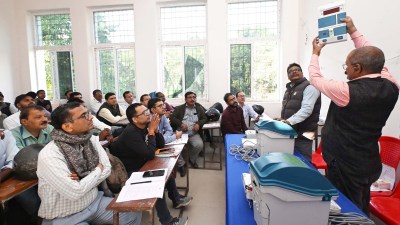At a field near the village of Baromashia in Birbhum district, a woman with a microphone in her hand spoke in Santhali as a group of about 100 men and women with lathis, bows, and arrows avidly listened to her.
Rows of concrete rooms at an abandoned stone crushing plant lay at one end of the field. These rooms, recently turned into restrooms, had freshly painted graffiti and slogans on the outer walls — “Koyla khoni hote debo na (We won’t let the coal mine project go ahead)” and “Koyla khadan nahi chalega (Coal mining won’t happen)” — apart from the name of the organisation, the Birbhum Jomi, Jibon, Jibika o Prakriti Banchao Mahasabha (Birbhum Mahasabha for Saving Land, Life, Livelihood, and Nature), leading a sit-in against the Deucha Pachami coal-mining project.

🗞️ Subscribe Now: Get Express Premium to access the best Election reporting and analysis 🗞️
Story continues below this ad
The coal block is the largest in India and the second largest in the world. About 40 per cent of the population of the Mohammed Bazar administrative block where the coal mine is located belongs to Scheduled Tribe communities. Last week, Deucha Pachami made the news after Chief Minister Mamata Banerjee alleged that the killings in Birbhum’s Bogtui village were a conspiracy to stall the project.
To date, the state government has identified 784 families in more than 90 villages for resettlement. Banerjee announced a compensation package last November for those who will get displaced or affected and assured there would not be any forcible land acquisition as had happened in Singur in 2006 under the Left Front.
But the protesters are not convinced and want the chief minister to initiate dialogue. “Today is a weekday and you see so many people,” the Mahasabha’s 36-year-old convener Ganesh Kisku, a resident of Palashbari village in the Bharkata area, told The Indian Express when it visited the protest site last week. “On Sunday, this field has over a thousand men and women from nearby villages. None of us will give up our land or our way of life.”
 The protesters also accused the ruling party and the local police of unleashing violence against those questioning the need to mine the coal block. (Express photo by Partha Paul)
The protesters also accused the ruling party and the local police of unleashing violence against those questioning the need to mine the coal block. (Express photo by Partha Paul)
The Mahasabha’s assistant secretary Jagannath Tudu said, “This is the nation’s largest coal block. The chief minister should have come and talked to us. Instead, we got some pamphlets from state government officers, some pseudo tribal leaders and Trinamool Congress (TMC) men. They did not even call a gram sabha.”
Story continues below this ad
The protesters also accused the ruling party and the local police of unleashing violence against those questioning the need to mine the coal block. They claimed that on December 23 the police beat up several villagers, including women, who had raised questions about a rally allegedly backed by the TMC and organised in support of the project.
Tudu alleged that TMC workers attacked protesters on February 20 after a meeting in Deoangunj. “They threatened those who attended the meeting. They also beat some of us. But the police filed a case against at least 200 of us. The more pressure was imposed and the more we were tortured, our strength grew and villagers joined us,” he added.
 Two days later, villagers, including several women, started the sit-in against the project in Harinsingha village. The protest was later relocated to Baromashia. (Express photo by Partha Paul)
Two days later, villagers, including several women, started the sit-in against the project in Harinsingha village. The protest was later relocated to Baromashia. (Express photo by Partha Paul)
Violence and commotion broke out again the following day at a rally organised by the Mahasabha in the area. The Communist Party of India (Marxist-Leninist) Liberation, the Jai Kisan Andolan, and a handful of social organisations also participated in the event. At the end of the demonstration, the police arrested seven activists from Kolkata and two local people. The police claimed they acted based on a suo motu case of an attack on them, and a case of abduction and attempted murder registered on a complaint by local TMC leader Sunil Soren. That day, the ruling party’s workers also allegedly ransacked the homes of some of the protesters.
Two days later, villagers, including several women, started the sit-in against the project in Harinsingha village. The protest was later relocated to Baromashia. “Instead of catching the culprits, the police slapped cases against many of us,” said Tudu.
Story continues below this ad
Dismissing the allegations, Soren said, “The chief minister has already said that there will be no forcible land acquisition. Already 2,600 families have agreed to give up their land and accept the compensation package. The allegation that force is being used is baseless. Land for the project will be taken after reaching out to people and with their consent. We will talk to those who are agitating. Some people are trying to create disturbance in the area.”
 The TMC government has assured the owners of stone quarries and crushing units they will receive the price for their land and compensation for their homes. (Express photo by Partha Paul)
The TMC government has assured the owners of stone quarries and crushing units they will receive the price for their land and compensation for their homes. (Express photo by Partha Paul)
Asked about the protests and the allegations of police violence, Birbhum District Magistrate Bidhan Roy told The Indian Express, “We have a plan to reach to those who are agitating. But at the moment I cannot say anything about that plan. If anyone did anything illegal, the law will take its course. We can only say that we are not doing anything illegally.”
The state government’s compensation package promises Rs 10 to 13 lakh per bigha of land and a 600-sq-ft home, Rs 1.2 lakh for relocation, and a junior police constable job for a member of each family. Around 3,000 workers of stone crushing units that will be closed will receive a Rs 50,000 one-time payment and Rs 10,000 per month for a year. Agricultural labourers have also been promised a Rs 50,000 one-time payment and 500 days of work under MGNREGS.
The TMC government has assured the owners of stone quarries and crushing units they will receive the price for their land and compensation for their homes. The stone crushing units will be relocated to an industrial park near the project and will get 10 free truckloads of stone daily for six months.
Story continues below this ad
But these promises do not mean much to the protesters. “They are promising jobs as constables. We are not educated enough for that. They are talking about small narrow quarters for us. We, tribals, have had a life and a lifestyle here for ages. We are dependent on the forest. We have space here for our families and our livestock. We will not leave our traditional village lives. The money they say they will give, will not last a lifetime for us,” said Dighal village resident Ratan Hembram.
The sentiment was shared by those at the protest site. ASHA worker Samdi Hansda (35) told The Indian Express, “Because people like us are involved in the movement, they stopped my salary and others for eight months. The salary was regularised recently but officials asked us to convince the people for the project. But, I never broke down. They threatened me that if I continued to be involved with the movement they would sack me. I said, ‘I do not want my job. I will not give my land for coal block’.”
Said Deresa Soren (28), “The government will give us homes, jobs and money. But for how many days will that feed us? If we have our land, we can feed our family from this land year after year. We will not give our land at any cost.”



 The protesters also accused the ruling party and the local police of unleashing violence against those questioning the need to mine the coal block. (Express photo by Partha Paul)
The protesters also accused the ruling party and the local police of unleashing violence against those questioning the need to mine the coal block. (Express photo by Partha Paul) Two days later, villagers, including several women, started the sit-in against the project in Harinsingha village. The protest was later relocated to Baromashia. (Express photo by Partha Paul)
Two days later, villagers, including several women, started the sit-in against the project in Harinsingha village. The protest was later relocated to Baromashia. (Express photo by Partha Paul) The TMC government has assured the owners of stone quarries and crushing units they will receive the price for their land and compensation for their homes. (Express photo by Partha Paul)
The TMC government has assured the owners of stone quarries and crushing units they will receive the price for their land and compensation for their homes. (Express photo by Partha Paul)





























